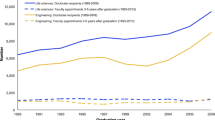Abstract
In order to ensure the future of high qualityresearch in some disciplines it may benecessary to provide special consideration inprestigious research funding schemes for earlycareer researchers who will otherwise becomedisenchanted with academic research and leaveit behind in their search for a stable andfruitful future. Milestones in progressionthrough research studies and academic life toestablishment as an academic researcher areoutlined. Within this context, a range ofpotential criteria for determining promisingearly career status are reviewed. Thediscussion leads to derivation of thedefinition of early career which has beenadopted by the Australian Research Council forits prestigious Discovery – Projects grantsscheme.
Similar content being viewed by others
References
Anderson, D., Arthur, R. and Stokes, T. (1997). Qualifications of Australian Academics: Sources and Levels 1978–1996. Canberra: Department of Employment, Education, Training and Youth Affairs, Higher Education Division, Evaluations and Investigations Program.
Bazeley, P. (1996). 'Can physicists find a future in academic research?', Australian New Zealand Physicist 33(11), 253–258.
Bazeley, P. (1998). 'Peer review and panel decisions in the assessment of Australian Research Council project grant applicants: what counts in a highly competitive context?', Higher Education 35, 435–452.
Bazeley, P. (1999). 'Continuing research by PhD graduates', Higher Education Quarterly 53(4), 333–352.
Bazeley, P., Kemp, L., Stevens, K., Asmar, C., Grbich, C., Marsh, H. and Bhathal, R. (1996). Waiting in the Wings: A Study of Early Career Academic Researchers in Australia, National Board of Employment Education and Training Commissioned Report No. 50. Canberra: Australian Government Publishing Service.
Becher, T. (1987). 'Disciplinary discourse', Studies in Higher Education 12, 261–274.
Biglan, A. (1973). 'The characteristics of subject matter in different academic areas', Journal of Applied Psychology 57, 195–203.
Bland, C.J. and Schmitz, C.C. (1986). 'Characteristics of the successful researcher and implications for faculty development', Journal of Medical Education 61(1), 22–31.
Brennan, M.H. (1993). 'Excellence and relevance-two sides of the same coin', in Wood, F.Q. and Meek, V.L. (eds.), Research Grants Management and Funding. Canberra: Bibliotech.
Emery, J.A., Meyers, H.W. and Hunter, D.E. (1992). 'NIH FIRST awards: testing background factors for funding against peer review', Journal of the Society of Research Administrators 24(2), 7–15.
Innes, J. (1995). 'Fixed term contracts or short sighted policy', Australian & New Zealand Physicist 32(5), 83–85.
Lightfield, E.T. (1971). 'Output and recognition of sociologists', The American Sociologist 6, 128–133.
NBEET (1993a). Higher Education Research Infrastructure. Canberra: Australian Govern-ment Publishing Service.
NBEET (1993b). 'Review of Grants Outcomes 7', Condensed Matter Physics. Canberra: Australian Government Publishing Service.
NBEET (1993c). 'Review of Grants Outcomes 8', Materials and Chemical Engineering. Canberra: Australian Government Publishing Service.
NBEET (1993d). 'Review of Grants Outcomes 9', Mathematical Sciences. Canberra: Australian Government Publishing Service.
NBEET (1993e). 'Review of Grants Outcomes 10', Organic Chemistry. Canberra: Australian Government Publishing Service.
NBEET (1993f). 'Review of Grants Outcomes 11', Fluid Mechanics. Canberra: Australian Government Publishing Service.
NBEET (1993g). 'Review of Grants Outcomes 12', Molecular Biology. Canberra: Australian Government Publishing Service.
NBEET (1994a). 'Review of Grants Outcomes 14', Psychology. Canberra: Australian Govern-ment Publishing Service.
NBEET (1995a). 'Review of Grants Outcomes 16', Inorganic Chemistry. Canberra: Australian Government Publishing Service.
NBEET (1995b). 'Review of Grants Outcomes 18', Computer Science. Canberra: Australian Government Publishing Service.
Over, R. (1993). 'Correlates of career advancement in Australian universities', Higher Education 26, 313–329.
Over, R. (1996). 'Perceptions of the Australian Research Council Large Grants Scheme: differences between successful and unsuccessful applicants', Australian Educational Researcher 23, 17–36.
Rip, A. (1993). 'The republic of science in the 1990s', in Wood, F.Q. and Meek, V.L. (eds.), Research Grants Management and Funding. Canberra: Bibliotech. Stoecker, J. L. (1993). 'The Biglan classification revisited', Research in Higher Education 34, 451–464.
Author information
Authors and Affiliations
Rights and permissions
About this article
Cite this article
Bazeley, P. Defining 'Early Career' in Research. Higher Education 45, 257–279 (2003). https://doi.org/10.1023/A:1022698529612
Issue Date:
DOI: https://doi.org/10.1023/A:1022698529612




